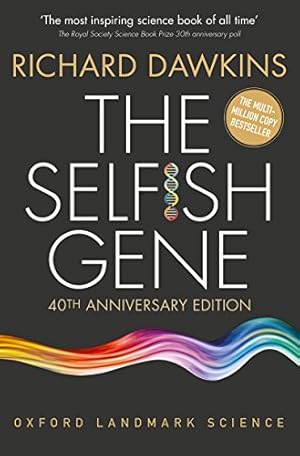| Digital List Price: | $12.99 |
| Kindle Price: | $8.79 Save $4.20 (32%) |
| Sold by: | Amazon.com Services LLC |
Your Memberships & Subscriptions

Download the free Kindle app and start reading Kindle books instantly on your smartphone, tablet, or computer - no Kindle device required.
Read instantly on your browser with Kindle for Web.
Using your mobile phone camera - scan the code below and download the Kindle app.

OK
The Extended Phenotype: The Long Reach of the Gene (Oxford Landmark Science) Reprint Edition, Kindle Edition
influence that reaches out beyond the visible traits in that body - the phenotype - to the wider environment, which can include other individuals. So, for instance, the genes of the beaver drive it to gather twigs to produce the substantial physical structure of a dam; and the genes of the cuckoo chick produce effects that
manipulate the behaviour of the host bird, making it nurture the intruder as one of its own. This notion of the extended phenotype has proved to be highly influential in the way we understand evolution and the natural world. It represents a key scientific contribution to evolutionary biology, and it continues to play an important role in research in the life sciences.
The Extended Phenotype is a conceptually deep book that forms important reading for biologists and students. But Dawkins' clear exposition is accessible to all who are prepared to put in a little effort.
Oxford Landmark Science books are 'must-read' classics of modern science writing which have crystallized big ideas, and shaped the way we think.
- ISBN-13978-0198788911
- EditionReprint
- PublisherOUP Oxford
- Publication dateSeptember 14, 2016
- LanguageEnglish
- File size769 KB
-
Next 3 for you in this series
$28.77 -
Next 5 for you in this series
$44.75 -
All 17 available for you in this series
$166.70
- The Planet in a Pebble: A journey into Earth's deep history (Oxford Landmark Science)
 Kindle Edition$9.99$9.99
Kindle Edition$9.99$9.99 - The Extended Phenotype: The Long Reach of the Gene (Oxford Landmark Science)
 Kindle Edition$8.79$8.79
Kindle Edition$8.79$8.79 - The Emerald Planet: How plants changed Earth's history (Oxford Landmark Science)
 Kindle Edition$9.99$9.99
Kindle Edition$9.99$9.99 - Deadly Companions: How Microbes Shaped our History (Oxford Landmark Science)
 Kindle Edition$7.99$7.99
Kindle Edition$7.99$7.99 - Decoding Reality: The Universe as Quantum Information (Oxford Landmark Science)
 Kindle Edition$7.99$7.99
Kindle Edition$7.99$7.99 - Power, Sex, Suicide: Mitochondria and the meaning of life (Oxford Landmark Science)
 Kindle Edition$9.99$9.99
Kindle Edition$9.99$9.99
Editorial Reviews
Review
About the Author
Product details
- ASIN : B01K2BLPN2
- Publisher : OUP Oxford; Reprint edition (September 14, 2016)
- Publication date : September 14, 2016
- Language : English
- File size : 769 KB
- Text-to-Speech : Enabled
- Screen Reader : Supported
- Enhanced typesetting : Enabled
- X-Ray : Not Enabled
- Word Wise : Enabled
- Sticky notes : On Kindle Scribe
- Print length : 485 pages
- Best Sellers Rank: #213,312 in Kindle Store (See Top 100 in Kindle Store)
- #19 in Genetic Science
- #89 in Evolution (Kindle Store)
- #125 in Genetics (Books)
- Customer Reviews:
About the author

Richard Dawkins taught zoology at the University of California at Berkeley and at Oxford University and is now the Charles Simonyi Professor of the Public Understanding of Science at Oxford, a position he has held since 1995. Among his previous books are The Ancestor's Tale, The Selfish Gene, The Blind Watchmaker, Climbing Mount Improbable, Unweaving the Rainbow, and A Devil's Chaplain. Dawkins lives in Oxford with his wife, the actress and artist Lalla Ward.
Customer reviews
Customer Reviews, including Product Star Ratings help customers to learn more about the product and decide whether it is the right product for them.
To calculate the overall star rating and percentage breakdown by star, we don’t use a simple average. Instead, our system considers things like how recent a review is and if the reviewer bought the item on Amazon. It also analyzed reviews to verify trustworthiness.
Learn more how customers reviews work on Amazon-
Top reviews
Top reviews from the United States
There was a problem filtering reviews right now. Please try again later.
Reading some of the other reviews of the book, it seems to strike many readers as difficult reading. I don't, on the whole, accept this claim. To be sure, the primary audience was intended to be professional biologists, but general audiences were not excluded as a possible readership as well. Most of the explanation is pretty intuitive, and even the comparatively more esoteric, specialized language can be easily deciphered by any non-biologist with the glossary provided in the back. I don't claim expertise on biology and especially genetics, but Dawkins does not fail to reach out to people like me. If I can do it so can you.
Dawkins's theoretical paradigm in this work, much like in _The Selfish Gene_, integrates heavily the thought and contributions of all the most important scientists of the modern synthesis, including William Hamilton, E.O. Wilson, George Williams, Robert Trivers, Ronald Fisher, and others. Moreover, he addresses the few, minor details where these men have erred. He also confronts assailants of gene-centered theory, especially Richard Lewontin and Stephen Jay Gould, and performs particularly well in his rebuttal of the strawman claim that proponents of the theory posit genetic determinism. One has no shortage of empirical evidence Dawkins cites for his theoretical claims to admire, either, including the examples snails, shrimps, various parasites, cuckoos, the prokaryotic origins of eukaryotic life, and many others. I can identify no noteworthy defects in this book whatsoever, empirically or theoretically.
Top reviews from other countries
Reviewed in the United Kingdom on November 27, 2021

























